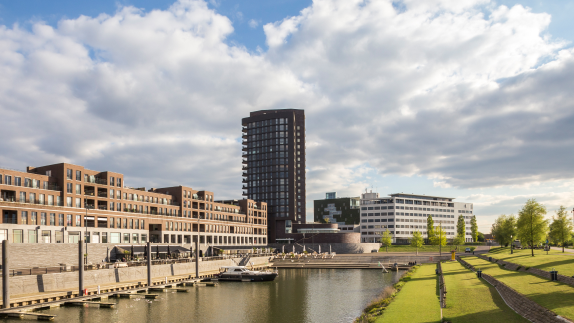The City of Toronto’s Circular Economy Procurement Implementation Plan and Framework has become a major tool to utilise municipal spending as a way to drive economic growth, enhance social prosperity, and move towards a zero waste city.
Toronto’s annual purchasing contracts amount to approximately CAD 2.7 billion in value. This represents considerable potential for suppliers with long-standing circular economycircular economyA systems solution framework that tackles global challenges like climate change, biodiversity loss, waste, and pollution. It is based on three principles, driven by design: eliminate waste and pollution, circulate products and materials (at their highest value), and regenerate nature. offerings or those that are beginning to integrate circular economy into their existing business models. The Framework outlines the City’s circular economy procurement objectives in addition to a number of opportunities for the City to leverage its buying power. The Framework is consistent with the direction and approach set out in the City’s 2016 Long Term Waste Management Strategy (LTWMS).
Core team and participants
In 2017, the City of Toronto’s Government Committee requested a strategy for City procurement to drive waste diversion through the circular economy, to support Toronto’s pledge to be the the first municipality in the province of Ontario with a circular economy strategy. In 2018, City staff proposed the Circular Procurement Implementation Plan and Framework. This work was co-led by staff from the Solid Waste Management Services Division (SWMS) and the Purchasing and Materials Management Division (PMMD).
The Circular Economy and Innovation (CEI) Unit in SWMS coordinated the work and convened a cross-divisional working group which included senior representatives from SWMS and PMMD in addition to nine other ‘champion’ divisions, namely: City Planning; Economic Development and Culture; Environment and Climate Division; Corporate Real Estate Management; Parks, Forestry and Recreation; Transportation Services; Toronto Water; Toronto Public Health; and Engineering and Construction Services.
Finance
The Solid Waste division identified an initial capital investment to set up the new Circular Economy and Innovation (CEI) unit (formally called UFRICE). The CEI unit is now part of the City of Toronto’s annual operating budget. The Circular Procurement Framework is one of many initiatives that CEI is working on to drive innovation and growth of a circular economy in Toronto.
Outcomes to date
The Framework outlines the City’s circular economy procurement objectives in addition to a number of opportunities for the City to leverage its buying power. Since the introduction of the Framework, CEI has collaborated with colleagues in SWMS and other City divisions to deliver several pilot procurements. These pilots explored how circular economy outcomes can be achieved by targeted interventions within the procurement process and what the integration of circular economy criteria and/or evaluation metrics could look like in a variety of City procurement documents. These projects have been varied in scope, scale and budget. Examples of these are described below.
Circular food system outcomes in the catering industry
Circular criteria and options have been embedded into the Request for Quotations (RFQs) process for the supply and delivery of food catering services
Staff have been enabled to reduce waste and support circular food system outcomes when ordering catering.
Circular design encouraged during the commissioning of street parklets
To animate the King Street Transit Priority Corridor in Toronto, a proposal for temporary parklets was put forward with optional circular economy design encouraged. The parklets consisted of creative structures that encouraged people to gather, sit and enjoy their surroundings.
Optional components included:
Specified criteria for the design-build process (e.g. proponents were encouraged to use methods that minimise waste during installation and at end-of-use)
Production and material selection (e.g. the use of refurbished, reclaimed, reusable, and/or recyclable materials)
Design and layout (e.g. designs that encouraged reuse through the use of modular components, rental arrangements, and/or post-installation donation).
All successful proponents were responsible for the disposal and/or sustainable reusereuseThe repeated use of a product or component for its intended purpose without significant modification. of the parklets at the end of the contract.
All of the 21 bid submissions incorporated circular design.
Circular economy principles applied to the organic waste processing services
The Request for Proposals (RFP) for organic waste processing services required suppliers to submit a Circular Economy Company Profile as part of their bid submission
This allowed staff to consider company investments or operational initiatives that support the circular economy as part of the technical evaluation.
Successful suppliers awarded a contract are required to work with the City to create a Circular Economy Action Plan and report annually on progress, enhancing the circular outcomes that could be delivered throughout the contract.
E-learning modules on circular procurement used to support City staff
The online training is geared toward both City staff working at the strategic policy level and those developing contract solicitation documents who have no previous knowledge of circular economy concepts
Major research project called Baselining for a Circular Toronto completed to explore the current level of circularity in Toronto
The study proposes a vision for what a circular Toronto could look like, highlights opportunities for advancing the circular economy in key sectors, and provides circular economy goals to guide Toronto’s work and indicators that could be used to measure success.
The study identified three key sectors where there is an opportunity to make resource and material loops more circular: the waste management sector, the construction sector, and the food system. These sectors also represent major spend categories at the City, which can be considered under the Circular Procurement Framework.
The Journey
Origins
In 2016, Toronto City Council adopted the Long Term Waste Management Strategy (LTWMS), endorsing the aspirational goals of zero waste and a circular economy and directing SWMS to develop a strategy and policy framework to make the City of Toronto the first municipality in the province with a circular economy. The strategy included a recommendation to create a dedicated circular economy unit to guide Toronto’s transition to becoming a circular city. As a result, in late 2017, CEI was formed and is one of the first dedicated circular economy units in a North American municipality.
Supportive actors
Toronto City Council supported circular procurement as an option to explore and put it on the agenda.
Toronto residents demonstrated public support through the LTWMS consultations, involving over 40 events, public meetings and approximately 3,400 survey responses between 2014 and 2016
Community members, local agencies, industry and civil society NGOs participated in a CEI-funded workshop that has spurred conversations promoting circular economy-related activities in Toronto, as well as the City’s Circular Economy Working Group, which has raised awareness among City staff
City staff from across a variety of City divisions have demonstrated their enthusiasm to learn more about circular economy approaches and explore how they can be operationalised in municipal service delivery
Measuring progress
As part of the City of Toronto’s wider circular economy portfolio, work is being done to develop key indicators and reporting strategies to measure the impact of the City’s efforts to transition to a circular economy, including, but not limited to, the circular procurement efforts. Currently, the City’s circular procurement work is being reported publicly through Toronto’s Environmental, Social and Governance Reports.
Reflections
Investing in staff is critical
Taking a circular approach to procurement involves transforming the way the City thinks about its needs, how services are delivered and how the City enters into contracts. This is a considerable transformation that requires understanding, buy-in, and capacity from City staff. Investing in staff will be critical to any circular procurement transformation, which is why the City of Toronto has developed e-learning modules, available to all City staff. No assumptions on baseline knowledge of circular economy among learners were made to ensure the training is as accessible as possible.
Testing, piloting, convening and partnering lead to rich learnings
Pilots have proved to be an effective one-off opportunity to experiment, identify market readiness, and realise quick wins. However, a pilot-centred approach does not lend itself well to design for long-term sustainment and replication because circular criteria and lessons learned from one pilot may not translate to another pilot focused on a different spend category.
Opening up new opportunities for businesses while speaking the right language is important
The framework opens up new opportunities for businesses to win contracts. The evolution of procurement in the City, alongside the assistance and motivation for businesses to innovate, supports Toronto’s wider goals of creating economic growth, enhancing social prosperity, and moving towards zero waste in the city. However, the circular economy is not yet a widely recognised language in the North American market for certain key municipal spend categories. For a circular procurement pilot to be successful, it is crucial to convey information in a manner that resonates with the target audience and sets vendors up for success when submitting a bid.
Managing risks is necessary
When introducing new concepts in City procurements, there is a need to manage risks and find the right balance between City ambition and the reality of what the market can deliver. One approach that has been adopted in several pilots has been making circular asks optional rather than mandatory. This helps to de-risk the procurement while setting up the proponents for a successful bid by reducing the burden of meeting mandatory requirements.
Specific goals need to be set
There are as many circular procurement approaches as there are goods and services to procure. This can create a significant challenge in terms of scoping a reasonable work plan for the circular procurement transformation. The City of Toronto is currently conducting a review of the first five years of circular procurement implementation, with the goal of bringing forward recommendations about how to better enable City staff to contribute to Toronto’s circular economy transition through procurement.
What’s Next
Developing a Circular Economy Road Map
This Road Map will recommend actions that various stakeholders, including the City of Toronto, can take to transition to a circular economy. Given the importance of partnerships and collaboration in realising a circular economy, various stakeholders will be engaged throughout the development of the Road Map, including working with residents to refine and expand upon the vision, goals and indicators proposed in the Baselining for a Circular Toronto study.
While Road Map development is underway, the City is also exploring opportunities for short-term activation to continue to build momentum in its circular economy transition. In January 2024, the City launched the Circular Food Innovators Fund to help local small businesses implement and expand reuse systems to contribute to the circular food system transformation. The City continues to explore and implement a variety of initiatives to drive innovation and the growth of a circular economy to achieve the following outcomes:
Increased resilience of services and infrastructure
Waste reduction, including reduction and diversion of waste streams not managed by the City's Integrated Waste Management System
Economic prosperity for a green and equitable pandemic recovery, including green-sector development and local supply chain resilience
Local emissions reduction to help build more resilient, low-carbon neighbourhoods
Enhanced well-being, equity and community activation fostered through partnerships with local agencies and non-profit organisations
Strengthened local innovation ecosystems to support local businesses and innovators to develop and scale circular business models
Download the case study, originally published in March 2019:




